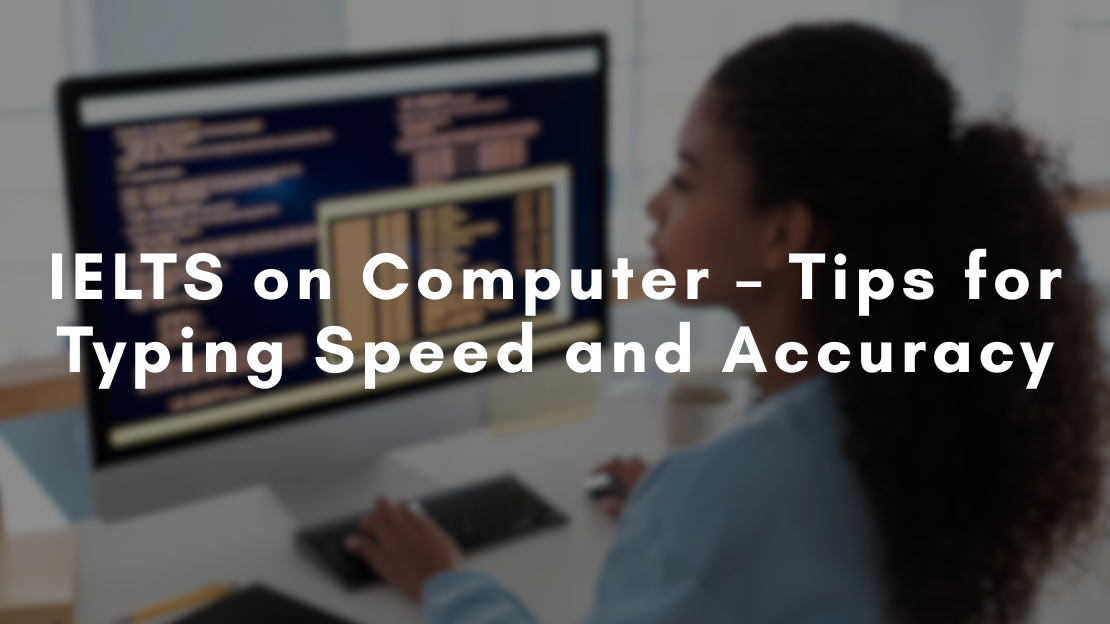 With the growing preference for digital exams, many test-takers now choose to take the IELTS on computer instead of the paper-based version. If you're preparing through a top IELTS coaching center in Ahmedabad, you're likely already familiar with this format. While the content of the test remains the same, your typing speed and accuracy can have a big impact—especially in the Writing section.
With the growing preference for digital exams, many test-takers now choose to take the IELTS on computer instead of the paper-based version. If you're preparing through a top IELTS coaching center in Ahmedabad, you're likely already familiar with this format. While the content of the test remains the same, your typing speed and accuracy can have a big impact—especially in the Writing section.
Whether you're new to computer-based testing or just want to improve your typing skills, the tips below will help you perform confidently on test day.
Why Typing Speed and Accuracy Matter
In the IELTS Writing test, you only have 60 minutes to complete two tasks—and every minute counts. Unlike handwriting, typing allows for quicker editing and faster writing, but it also comes with challenges like typos and poor structure due to rushing.
Typing too slowly might stop you from completing your thoughts, while too many mistakes can confuse the examiner and lower your score. This is why improving your typing habits can directly benefit your final band score.
Tips to Improve Typing Speed
1. Practice Touch Typing
Touch typing is the ability to type without looking at the keyboard. It helps increase both speed and accuracy over time. Use free online platforms like Keybr.com or 10FastFingers to build your muscle memory.
2. Use IELTS Writing Prompts for Practice
Instead of random typing drills, practice by writing essays based on real IELTS prompts. This gives you a feel for typing under realistic test conditions.
3. Set Time Limits
Train yourself to type under time pressure. For example, give yourself 20 minutes for Task 1 and 40 minutes for Task 2. This will help you manage time during the actual test.
4. Monitor Word Count
The IELTS computer interface shows your word count as you type. Get used to checking your word count without relying too much on it. With regular practice, you’ll be able to estimate how much you’ve written naturally.
Tips to Boost Typing Accuracy
1. Avoid Sloppy Typing
Accuracy matters more than speed. A well-written answer with minimal typos creates a better impression than a fast but error-filled essay. Always proofread your response before submitting.
2. Use Grammar and Spell Check Tools During Practice
While these tools won’t be available during the test, using them in your practice sessions will help you recognize and correct your most common mistakes.
3. Focus on Sentence Structure
Rushing often leads to fragmented or unclear sentences. Slow down slightly to ensure each sentence is complete and well-structured.
4. Stay Calm and Don’t Panic
Typing errors increase when you're anxious. Try to stay calm and focused during the test. Confidence and regular typing practice will help you stay in control.
Common Mistakes to Avoid
- Typing too fast without accuracy
- Skipping proofreading
- Ignoring instructions (like minimum word count)
- Not organizing ideas into paragraphs
- Relying on repetitive vocabulary
Conclusion
Taking the IELTS on computer can be a smooth experience if you're well-prepared. Focusing on both typing speed and accuracy can greatly impact your performance—especially in the Writing section. Regular practice, mock tests, and a calm mindset are key to success. Whether you’re training on your own or with support from a top IELTS coaching center in Ahmedabad, make sure to simulate test conditions to gain confidence before exam day.
FAQs
1. Is the computer-based IELTS test harder than the paper-based test?
No, both versions have the same questions and scoring system. The only difference is in the delivery format.
2. Can I make edits easily in the IELTS on computer test?
Yes, the test interface allows easy cutting, copying, and pasting, making editing more convenient than on paper.
3. What happens if I type too slowly?
You may not complete your response in time, which can lower your score. That’s why it's important to improve your speed through practice.
4. Is there a spell checker in the IELTS on computer test?
No, there is no automatic spell checker. You need to manually check your spelling and grammar.
5. Can I take notes during the computer-based IELTS test?
Yes, you’ll be provided with paper and a pen to take notes, especially useful for Listening and Writing sections.


